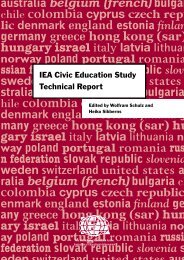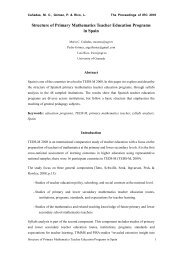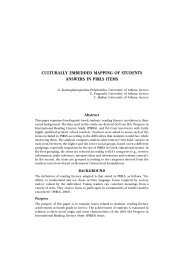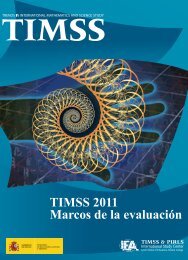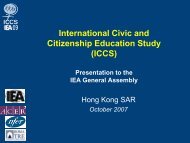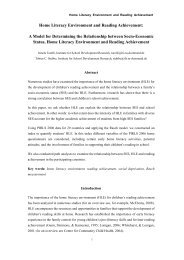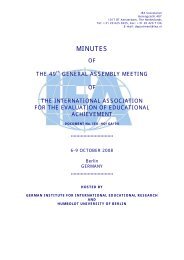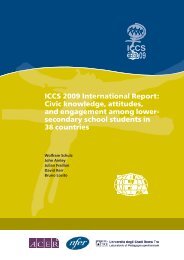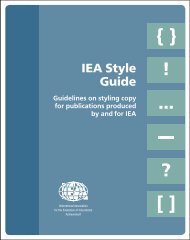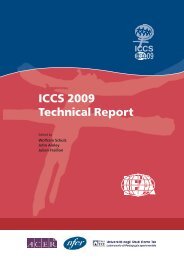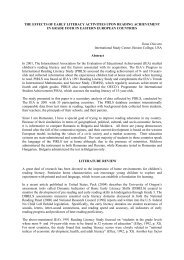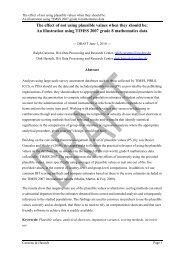International civic and citizenship education study - iccs - IEA
International civic and citizenship education study - iccs - IEA
International civic and citizenship education study - iccs - IEA
- TAGS
- civic
- citizenship
- iccs
- www.iea.nl
Create successful ePaper yourself
Turn your PDF publications into a flip-book with our unique Google optimized e-Paper software.
Structure of the affective-behavioral domains<br />
The four affective-behavioral domains are described in terms of the types of student perceptions<br />
<strong>and</strong> behaviors relevant with respect to the <strong>civic</strong> <strong>and</strong> <strong>citizenship</strong> content domains.<br />
Structure of the cognitive domains<br />
The two cognitive domains are each defined in terms of the cognitive processes that comprise<br />
them.<br />
Key terms<br />
The ICCS assessment framework uses a set of key terms. Definitions of these follow. Note that<br />
the exact definitions of many of the terms used in the framework are the subject of ongoing<br />
<strong>and</strong> vigorous academic dialogue. The definitions of the key <strong>and</strong> domain-specific terms in this<br />
framework have been constructed to support consistent underst<strong>and</strong>ings of the framework’s<br />
contents across the broad range of countries participating <strong>and</strong> interested in ICCS.<br />
Community A group of people who share something in common (for example,<br />
history, values, loyalties, a common goal). In this framework, community<br />
membership includes membership based on externally defined criteria<br />
relating to the function of the community (such as attending a school as<br />
a student) <strong>and</strong> membership defined by individuals’ own belief of their<br />
membership (such as through identification with “like-minded” people<br />
regarding a political or social issue). 2<br />
Society A community defined by its geographical territory <strong>and</strong> within which the<br />
population shares a common culture (which may comprise <strong>and</strong> celebrate<br />
multiple <strong>and</strong> diverse ethnic or other communities) <strong>and</strong> way of life under<br />
conditions of relative autonomy, independence, <strong>and</strong> self-sufficiency.<br />
Citizenship 1. The legal status of being a citizen.<br />
ICCS ASSeSSment FrAmework<br />
2. The fact of individuals’ participation, or lack of participation, in their<br />
communities. The term “<strong>citizenship</strong>,” unlike the term “active <strong>citizenship</strong>,”<br />
does not assume certain levels of participation.<br />
Civil Refers to the sphere of society in which the shared connections between<br />
people are at a level larger than that of the extended family but do not<br />
include connections to the state.<br />
Civic Refers to any community in which the shared connections between<br />
people are at a level larger than that of the extended family (including<br />
the state). Civic also refers to the principles, mechanisms, <strong>and</strong> processes of<br />
decisionmaking, participation, governance, <strong>and</strong> legislative control that exist<br />
in these communities.<br />
2 Note that a community may still contain any level of diversity.<br />
15



